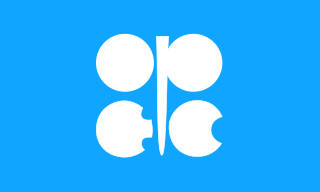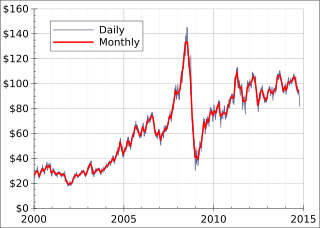
The Organization of the Petroleum Exporting Countries is an organization enabling the co-operation of leading oil-producing and oil-dependent countries in order to collectively influence the global oil market and maximize profit. It was founded on 14 September 1960 in Baghdad by the first five members. The organization, which currently comprises 12 member countries, accounted for an estimated 30 percent of global oil production. A 2022 report further details that OPEC member countries were responsible for approximately 38 percent of it. Additionally, it is estimated that 79.5 percent of the world's proven oil reserves are located within OPEC nations, with the Middle East alone accounting for 67.2 percent of OPEC's total reserves.
A multinational corporation is a corporate organization that owns and controls the production of goods or services in at least one country other than its home country. Control is considered an important aspect of an MNC to distinguish it from international portfolio investment organizations, such as some international mutual funds that invest in corporations abroad simply to diversify financial risks. Black's Law Dictionary suggests that a company or group should be considered a multinational corporation "if it derives 25% or more of its revenue from out-of-home-country operations".

In October 1973, the Organization of Arab Petroleum Exporting Countries (OAPEC) announced that it was implementing a total oil embargo against the countries who had supported Israel at any point during the 1973 Yom Kippur War, which began after Egypt and Syria launched a large-scale surprise attack in an ultimately unsuccessful attempt to recover the territories that they had lost to Israel during the 1967 Six-Day War. In an effort that was led by Faisal of Saudi Arabia, the initial countries that OAPEC targeted were Canada, Japan, the Netherlands, the United Kingdom, and the United States. This list was later expanded to include Portugal, Rhodesia, and South Africa. In March 1974, OAPEC lifted the embargo, but the price of oil had risen by nearly 300%: from US$3 per barrel ($19/m3) to nearly US$12 per barrel ($75/m3) globally. Prices in the United States were significantly higher than the global average. After it was implemented, the embargo caused an oil crisis, or "shock", with many short- and long-term effects on the global economy as well as on global politics. The 1973 embargo later came to be referred to as the "first oil shock" vis-à-vis the "second oil shock" that was the 1979 oil crisis, brought upon by the Iranian Revolution.
Petrocurrency is a word used with three distinct meanings, often confused:
- Dollars paid to oil-producing nations —a term invented in the 1970s meaning trading surpluses of oil-producing nations.
- Currencies of oil-producing nations which tend to rise in value against other currencies when the price of oil rises.
- Pricing of oil in US dollars: currencies used as a unit of account to price oil in the international market.

Petroleum politics have been an increasingly important aspect of diplomacy since the rise of the petroleum industry in the Middle East in the early 20th century. As competition continues for a vital resource, the strategic calculations of major and minor countries alike place prominent emphasis on the pumping, refining, transport, sale and use of petroleum products.

Sweet crude oil is a type of petroleum. The New York Mercantile Exchange designates petroleum with less than 0.5% sulfur as sweet.

The price of oil, or the oil price, generally refers to the spot price of a barrel of benchmark crude oil—a reference price for buyers and sellers of crude oil such as West Texas Intermediate (WTI), Brent Crude, Dubai Crude, OPEC Reference Basket, Tapis crude, Bonny Light, Urals oil, Isthmus, and Western Canadian Select (WCS). Oil prices are determined by global supply and demand, rather than any country's domestic production level.
For further details see the "Energy crisis" series by Facts on File.

The nationalization of oil supplies refers to the process of confiscation of oil production operations and their property, generally for the purpose of obtaining more revenue from oil for the governments of oil-producing countries. This process, which should not be confused with restrictions on crude oil exports, represents a significant turning point in the development of oil policy. Nationalization eliminates private business operations—in which private international companies control oil resources within oil-producing countries—and transfers them to the ownership of the governments of those countries. Once these countries become the sole owners of these resources, they have to decide how to maximize the net present value of their known stock of oil in the ground. Several key implications can be observed as a result of oil nationalization. "On the home front, national oil companies are often torn between national expectations that they should 'carry the flag' and their own ambitions for commercial success, which might mean a degree of emancipation from the confines of a national agenda."

Russia–Saudi Arabia relations are the bilateral relations between the Russian Federation and the Kingdom of Saudi Arabia. The two countries are referred to as the two petroleum superpowers and account for about a quarter of the world's crude oil production between them.
Nathaniel Kern, also known as Nat Kern, is President of Foreign Reports Inc., a consulting firm founded in 1956 to provide political reporting and analysis for the oil industry. He has been with the firm since 1972, becoming Vice President in 1975 and President in 1990. His company advises energy companies, governments, and financial institutions on world energy issues, with a specialization on the Middle East.

From the mid-1980s to September 2003, the inflation adjusted price of a barrel of crude oil on NYMEX was generally under $25/barrel. Then, during 2004, the price rose above $40, and then $60. A series of events led the price to exceed $60 by August 11, 2005, leading to a record-speed hike that reached $75 by the middle of 2006. Prices then dropped back to $60/barrel by the early part of 2007 before rising steeply again to $92/barrel by October 2007, and $99.29/barrel for December futures in New York on November 21, 2007. Throughout the first half of 2008, oil regularly reached record high prices. Prices on June 27, 2008, touched $141.71/barrel, for August delivery in the New York Mercantile Exchange, amid Libya's threat to cut output, and OPEC's president predicted prices may reach $170 by the Northern summer. The highest recorded price per barrel maximum of $147.02 was reached on July 11, 2008. After falling below $100 in the late summer of 2008, prices rose again in late September. On September 22, oil rose over $25 to $130 before settling again to $120.92, marking a record one-day gain of $16.37. Electronic crude oil trading was temporarily halted by NYMEX when the daily price rise limit of $10 was reached, but the limit was reset seconds later and trading resumed. By October 16, prices had fallen again to below $70, and on November 6 oil closed below $60. Then in 2009, prices went slightly higher, although not to the extent of the 2005–2007 crisis, exceeding $100 in 2011 and most of 2012. Since late 2013 the oil price has fallen below the $100 mark, plummeting below the $50 mark one year later.
Sources include: Dow Jones (DJ), New York Times (NYT), Wall Street Journal (WSJ), and the Washington Post (WP).
The posted price of oil was the price at which oil companies offered to purchase oil from oil-producing governments. This price was set by the oil companies and used to calculate the share of oil revenues that oil-producing countries would receive. Between 1957 and 1972, the posted price was greater than the market price of crude oil. Between 1961 and 1970 the market price hovered between $1.30 and $1.50 per barrel, while the posted price was a constant $1.80.

On 14 September 2019, drones were used to attack oil processing facilities at Abqaiq and Khurais (خريص) in eastern Saudi Arabia. The facilities were operated by Saudi Aramco, the country's state-owned oil company. The Houthi movement in Yemen claimed responsibility, tying it to events surrounding the Saudi intervention in the Yemeni Civil War and stating they used ten drones in the attack launched from Yemen, south of the facilities. Saudi Arabian officials said that many more drones and cruise missiles were used for the attack and originated from the north and east, and that they were of Iranian manufacture. The United States and Saudi Arabia have stated that Iran was behind the attack while France, Germany, and the United Kingdom jointly stated Iran bears responsibility for it. Iran has denied any involvement. The situation exacerbated the 2019 Persian Gulf crisis.

On 8 March 2020, Saudi Arabia initiated a price war on oil with Russia, which facilitated a 65% quarterly fall in the price of oil. The price war was triggered by a break-up in dialogue between the Organization of the Petroleum Exporting Countries (OPEC) and Russia over proposed oil-production cuts in the midst of the COVID-19 pandemic. Russia walked out of the agreement, leading to the fall of the OPEC+ alliance.